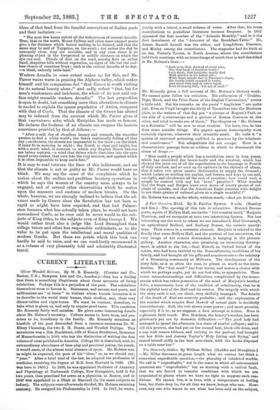A. Fair Country Maid. By E. Fairfax Byrrne. 3 vols.
(Bentley and Son.)—The opening of this tale is•attractive. Derrick Devon- porte, squire of Hollyss Hall, meets the "fair country maid," Marjorie Morrison, and we recognise at once two interesting figures. Not leas interesting are the next to whom we are introduced, Abel Greenough, an agricultural Radical, and Zachary Pearse, the artistic quarry- man. Then comes in a romantic element. Marjorie is related to the family that owns Hollysi Hall, and the portrait of her ancestress, the very imago of her remote descendant, is hanging in the picture. gallery.' Another character, also promising an interesting diivelop. meat, is added to the list,—Saul Howell, an Oxford friend of the squire, who had been faithful to the Nonconforming traditions of his family, and had brought all his gifts and acquirements to the ministry of a Dissenting community at Milltown. The development of the story fails, as is so often the case, to please as much as the intro- duction. The "fair maid" has four lovers, and makes a choice with which we perhaps ought, yet do not feel able, to sympathise. Then come misunderstandings and difficulties, complicated by the mono- mania which has taken possession of the mind of Marjorie's brother John, a monomania born of the tradition of relationship, that he is the rightful heir of the Hall and its estates. The tragedy with which the story ends is not, we think, very skilfully managed. The details
of the death of Abel are scarcely probable ; and the explanation of the murder which acquits Saul Howell of actual guilt is decidedly unsatisfactory. Still, the tale shows some power ; and more promise, especially if it be, as we suppose, a first attempt in fiction. Hero is a pleasant little touch. Mrs. Morrison, the beauty's mother, has been grievously put out by domestic difficulties :—" The good lady had arranged to spend the afternoon in a state of tearful collapse; and to aid this process, she had pat on her second-best, black-silk dress, and a cap with mauve ribbons, and retiring to the parlour, had brought oat her Bible and Jeremy Taylor's 'Holy Living and Dying,' and seated herself stiffly in the best arm-chair, with the books disposed on a table near her."


































 Previous page
Previous page